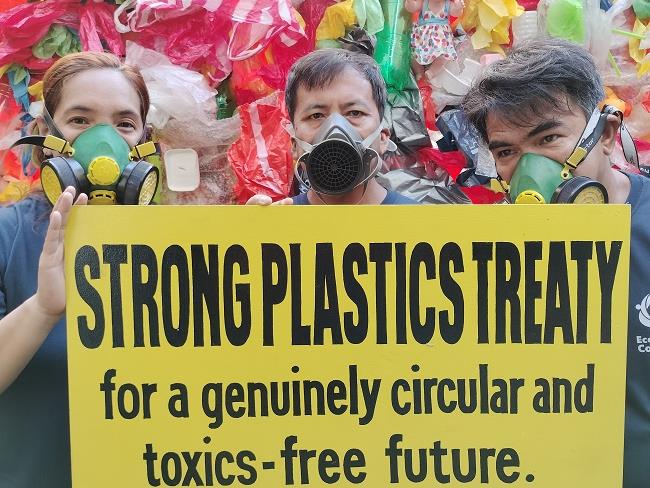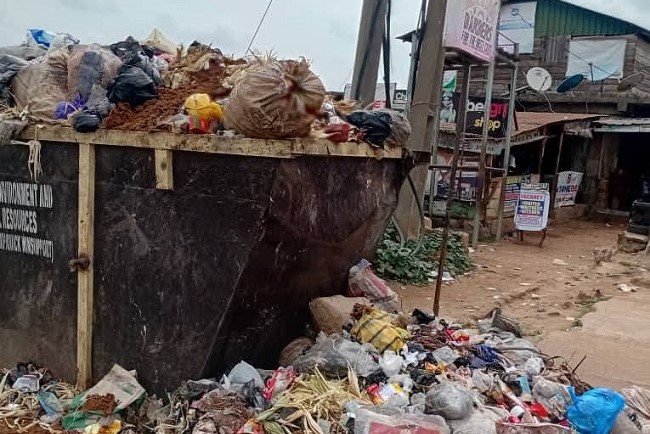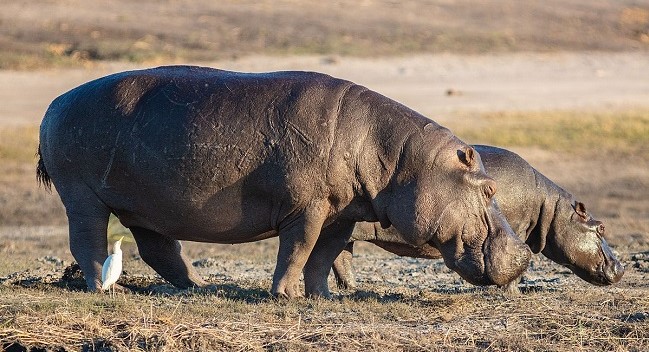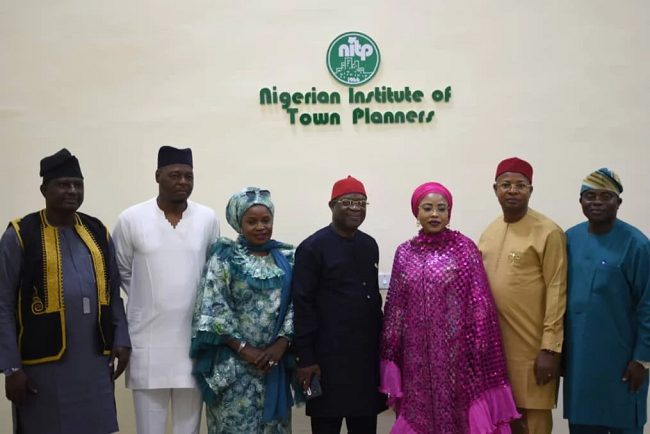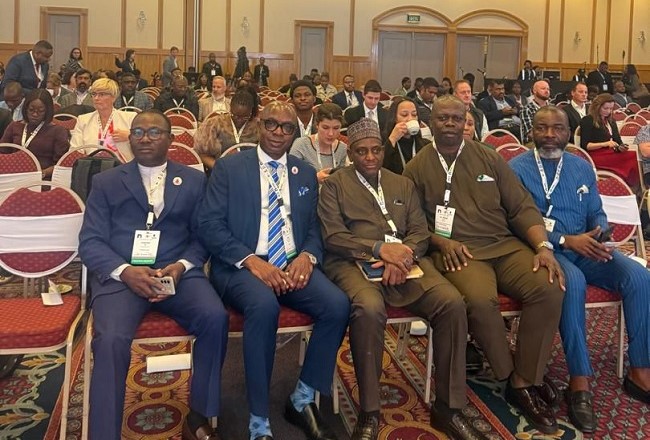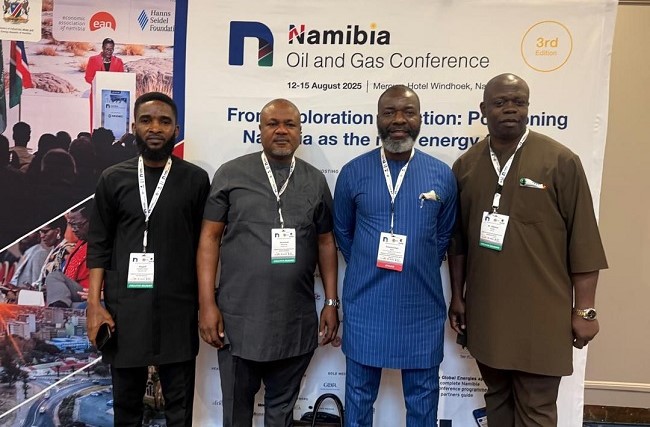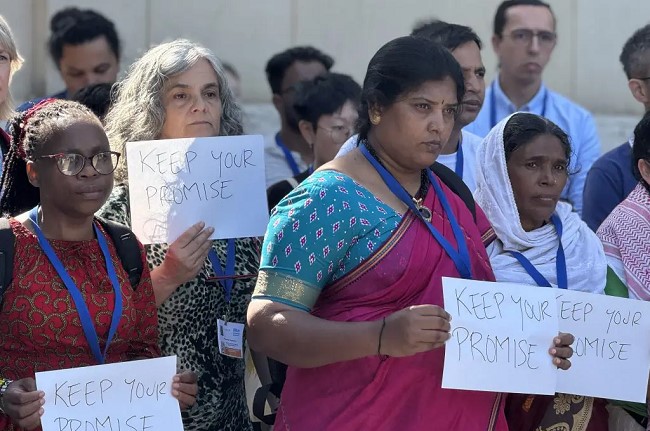Talks on the world’s first legally binding treaty to end plastic pollution are hanging in the balance with just two days left before the deadline and negotiators deadlocked over the most contentious issues, including limits on production.
Environmentalists and Indigenous leaders held signs on Tuesday, August 12, 2025, asking nations to show courage and agree to a strong treaty.
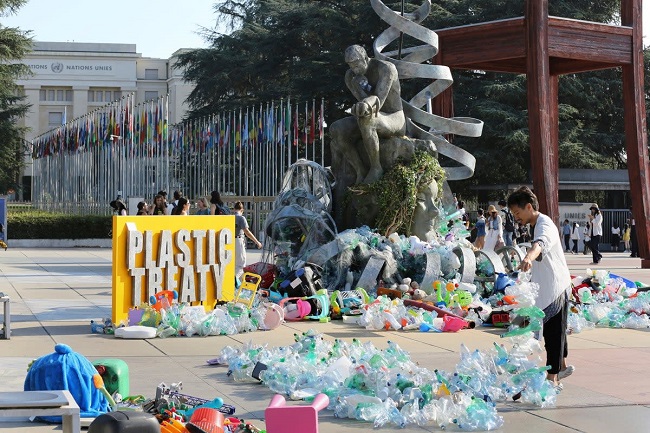
“We’ve invested a lot into coming all the way to Geneva, away from our communities, away from our families, because we understand how important an issue this is and how crucial a moment this is,” said Juressa Lee, who is from New Zealand and was representing the Aotearoa Plastic Pollution Alliance.
“It’s a once-in-a-lifetime plastics treaty.”
A coalition of environmental and health organisations have said countries were “moving far too slowly” after the first week, and that “blocking countries” risked pushing the talks towards a “lowest common denominator” outcome.
They warned that without urgent compromises, the session could fail to produce a treaty capable of tackling the scale of the crisis.
“We’re talking about negotiations that could fundamentally change our plastic future and yet the attention, the focus, is nowhere near what you would expect given the health and environmental stakes,” said Graham Forbes, global plastics campaign lead at Greenpeace.
The final round of talks started in Geneva last Tuesday, after a collapse at the previous session in Busan last year when countries failed to bridge deep divisions. The process, launched in 2022, aims to create a treaty covering the full life cycle of plastics, from production to disposal.
“To date the process has been broken,” said Brett Nadrich, spokesperson from Break Free From Plastic. “Civil society leaders from around the world, together with those most impacted, are speaking with a unified voice that we need to show courage, not compromise, and fix the process.”
At the heart of the disagreement is Article 6, which addresses the supply of primary plastic polymers and whether the treaty should impose mandatory production cuts. High Ambition Countries, or nations pushing for the plastics treaty to include strong, legally binding measures, and health advocates say it’s essential to put a production cap on plastics to address pollution at its source, while petrochemical producers and their allies argue the focus should remain on waste management and recycling.
“The elephant in the room is production,” Mr. Forbes said. “If you want to end plastic pollution, you have to stop making so much plastic. It’s simple.”
However, he added: “The fossil fuel industry is one of the most powerful corporate interests in the world. As they see a decline in demand for transportation and energy, they are doubling down on producing more plastic to extract short-term profits at the expense of all of us.”
Some countries have openly said in the last talks in Busan that if a strong treaty isn’t agreed upon under the UN, they will come together as a group to create a deal of their own. However, experts say such an arrangement has its own limitations.
“Proponents of this approach usually say that this could still be useful. They usually don’t admit that what they mean is that it would be “better than nothing” but actually not very efficient,” Aleksandar Rankovic, cofounder and director at think tank The Common Initiative, said.
“Signing countries could do something at home indeed – which they can do now, even without the treaty – and better cooperate on different points. But such a treaty could not, by design since it wouldn’t include the main plastic producers, aim at curbing plastic production and pollution globally.”
Meanwhile, plastic production is set to continue rising and more and more evidence shows there are health risks associated with microplastics and related chemicals. A study by Greenpeace analysing the air negotiators are breathing in Geneva, one of the cleanest cities in the world, detected plastic fibres and fragments in both indoor and outdoor locations, including cafés, public transport and shops.
Bjorn Beeler, international coordinator of the International Pollutants Elimination Network (IPEN), said producing more plastics is becoming a “planetary crisis”.
“By the year 2060, you’re looking at four times more plastic on the planet than you have today,” he said. “That’s enormous if you think about just the volume of that material – and it’s not only the plastics, it’s the number of chemicals used to produce that.”
“The third planetary crisis is chemical pollution, harming human health and even the ability of the next generation to reproduce.”
“Who’s responsible? Who should pay for this mess? If it’s circularity and recycling, it’s you and me, taxpayers. If you export primary plastic polymers, you should pay. You’re exporting pollution and telling everybody else to recycle,” he said.
As the talks entered the second week, the presence of industry lobbyists remained a flashpoint. The Centre for International Environment Law (CIEL) said at least 234 fossil fuel and petrochemical industry lobbyists have registered to attend the conference and they were part of some country delegations as well.
In a statement at the beginning of talks, International Council of Chemical Associations (ICCA) spokesman, Matthew Kastner, said: “Our delegates are here to listen to governments so we can understand the unique challenges they face and bring solutions that leverage innovations and the deep technical expertise our industries have that can help end plastic pollution.”
Civil society groups have accused the industry of trying to weaken the treaty by promoting “circularity” as a substitute for production cuts, and pushing controversial “chemical recycling” technologies that environmentalists describe as polluting.
Circularity is the idea that plastics should be kept in use for as long as possible through reuse and recycling, but critics say it is being misused to justify continued high levels of plastic production without tackling the root cause.
Campaigners have also sought to draw attention to the health impacts of plastics. Outside the Palais des Nations, Canadian artist Benjamin Von Wong’s six-metre-high sculpture The Thinker’s Burden has been gradually engulfed in plastic waste each day of the talks.
“From the air we breathe to the food we eat, microplastics and toxic chemicals are entering our bodies, and future generations will inherit the consequences if we fail to act now,” Mr. Von Wong said.
Medical researchers have found that microplastics less than 10 micrometres in size, small enough to be inhaled deep into the lungs, make up the vast majority of airborne plastic particles. A recent French study estimated adults inhale around 68,000 of these ultra-fine particles every day.
The treaty’s outcome, as the negotiations conclude on Thursday, will determine whether the final text addresses such upstream drivers of pollution or concentrates on downstream waste management.
By Stuti Mishra, The Independent

